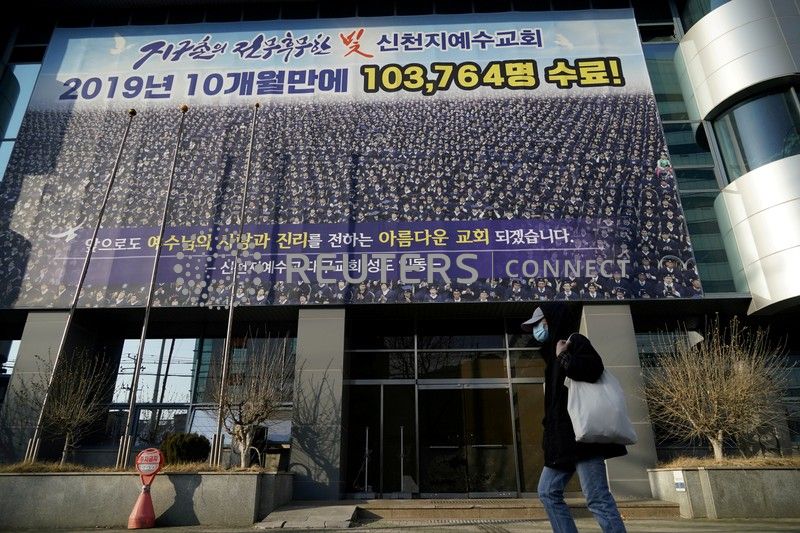DAEGU/SEOUL, South Korea (Reuters) – An So-young had a gut feeling that the 31st person in South Korea to test positive for the coronavirus might be a member of the controversial religious sect she quit four years ago.
The person, dubbed “Patient 31,” was the first of an explosive wave of cases that made South Korea’s outbreak the largest outside of China. What caught An’s attention was how health authorities were struggling to track the woman’s movements before she was tested.
“That’s their culture, they have to hide their movements, and that’s why I guessed she was with Shincheonji,” An, 27, said in an interview, referring to the Shincheonji Church of Jesus.
Patient 31 attended services at the church’s branch in the southeastern city of Daegu this month, staying for two hours each time, before testing positive on Feb. 18.
The South Korean disease control chief Jeong Eun-kyeong said the church’s services, where thousands of people sit on the floor, shoulder-to-shoulder, for hours, could have contributed to the surges.
“You would be 5 centimetres away from the person who sits next to you, and have to say ‘Amen’ after every sentence the pastor speaks – it’s the best environment for the virus to spread,” said An, who is now a theology student.
In a media interview, Patient 31 said she did not refuse to be tested. But health authorities said she sought care at a traditional medicine hospital in Daegu after a minor car accident, where a medical worker who treated her later tested positive for the virus. While running a fever, she went to a buffet at a hotel and the church services.
Shincheonji is in the biggest crisis in its 36-year history, as hundreds of members have tested positive for the virus, SARS-CoV-2. All of its 210,000 known followers are being tested amid unprecedented scrutiny from authorities and the public.
After initial resistance, the church released the addresses of 1,100 facilities around the country – 82 churches and 1,018 “affiliates,” – and asked the public to avoid making “groundless criticism.” It was the “biggest victim of the virus,” it said.
Calls by Reuters to the church’s headquarters seeking comment went unanswered.
During a visit to the Daegu branch on Friday, a man who identified himself as a member said he was the only one there and told Reuters that “all of our 9,000 members are taking self-quarantine measures in compliance with the government instruction.” He said the building was disinfected twice last week.
Interactive graphic: The Korean clusters https://tmsnrt.rs/398tjZO
‘THE DEVIL’S DEED’
South Korea reported 334 new cases of the coronavirus on Thursday, bringing the national tally to 1,595. More than 1,000 are from Daegu, according to the Korea Centres for Disease Control and Prevention (KCDC), and nearly 600 are directly linked to Shincheonji’s branch there.
KCDC said that it is still investigating the exact origin of the outbreak, but that five or six other members of the church were infected together with Patient 31.
The church had a presence in Wuhan, the centre of the virus in China, according to the KCDC, though it is unclear whether that played a role.
Also known as the Temple of the Tabernacle of the Testimony, the church was founded and is headed by self-proclaimed messiah Lee Man-hee.
“This disease case is the devil’s deed to stop the rapid growth of Shincheonji,” Lee said in a message on Friday on an internal app used by members.
But its secretive practices and often-aggressive recruitment tactics have made the church a controversial presence in South Korea’s religious community.
New members are forced to leave home and live in dormitories as part of initiation. Many break ties with their family and begin aggressively recruiting new members, An said.
According to its website, followers must undergo six months of classes and complete a demanding written exam before “graduating” and joining the church.
The church has denied previous reports by Christian news organisations describing it as a “brainwashing cult”, calling those accusations “blatant lies” and a plot to rein in its expansion.
‘SECRET HARVESTERS’
All members work as “harvesters” tasked with courting new followers from other churches, dubbed “harvest fields”, former members said.
“It may appear Christian, but is actually completely different. They revere founder Lee Man-hee as a saviour, like Jesus,” said Lee Duck-sure, a Christian pastor who runs a counselling centre in Seoul for former members of Shincheonji.
South Koreans vented anger after an official at a Daegu public health centre that carries out virus tests continued to work even after he was told to get tested. He revealed he was a member of the Daegu Shincheonji church only after the test showed he was infected, Daegu officials said.
But health officials and experts cautioned the blame should not be focused on the church and its believers, saying they were also victims.
KCDC is also looking into links between the church and a hospital in nearby Cheongdo County, which reported the second-highest number of patients in the country with more than 110.
The county is a holy site for Shincheonji believers as the birthplace of Lee, and recently a funeral for his older brother was held at that hospital.
On a recent visit, the Daegu church was shuttered and silent, surrounded by empty streets and closed stores. Someone had thrown eggs at the front gate of the building.
Son, who did not want to give her full name and lives in the neighbourhood, said many believers, especially young women, have moved to live near the church, and several restaurants are run by members.
Doo Song-Ja, 64, said she had not heard from her daughter since 2015, when she joined the church.
“I’m so worried because so many Shincheonji followers are testing positive but I don’t know where she is,” said Doo, who said her 33-year-old daughter had sued her for “forcible confinement” for trying to keep her home. “I just hope she is OK.”





